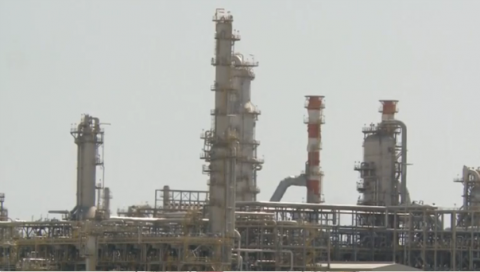
YANBU, Saudi Arabia (CCTV) — Cooperation between China and Saudi Arabia in the oil industry has become closer in recent years, expanding from exploration to the refinery sector, a progress that Amin H. Nasser, president of Saudi Aramco, attributes to China-proposed “Belt and Road” initiative, which fits in well with Saudi Vision 2030.
A typical case that inks their closer ties is Yanbu Aramco Sinopec Refining Company or Yasref, a joint venture in which Saudi Aramco retains 62.5 percent of stake and China Petrochemical Corporation (Sinopec) holds 37.5 percent.
Established in 2014, the company has become one of the world’s largest refineries with a daily refining capacity of 400,000 barrels of crude.
Li Xihong, representative of Sinopec in Saudi Arabia, said the program is a win-win case for both the Chinese and Saudi parties.
“It is strategically important for both the Chinese refinery and engineering services to expand globally and the economic transformation of Saudi Arabia,” said Li.
Saudi Arabia, the Middle East’s largest oil producer, has been facing mounting pressure of high deficit in its budget over the past two years due to the slump of global oil prices. To cut the country’s reliance on oil, the Kingdom launched a plan named “Saudi Vision 2030” last April.
Amin H. Nasser said the Belt and Road initiative, first proposed by Chinese President Xi Jinping in 2013 as a way to boost regional connectivity, could bring Chinese investment and advanced manufacturing capacity to Saudi Arabia.
“We are looking at also the investment in the Kingdom in terms of construction, infrastructure, creating a lot of trades across the Kingdom and to other regions from the Kingdom. In China, we are looking at also a lot of opportunities, to open business opportunities in China, especially in the downstream sector, as I said, also Vision 2030 for the Kingdom,” said Nasser.
Lu Dong, vice president of Sinopec Engineering Co. Ltd., a subsidiary of the Sinopec Group, said the initiative also helped Chinese enterprises go global and sharpen their competitiveness worldwide.
“The overseas businesses accounted for only 12-15 percent of the company’s overall business in 2012. By the end of 2016, the ratio of our overseas business had approximated 40 percent, thanks to the fast expansion in the countries along the route of Belt and Road initiative,” said Lu.
The Belt and Road initiative consists of a land-based New Silk Road Economic Belt, which links China with Europe through Central and Western Asia, and the oceangoing 21st Century Maritime Silk Road.







